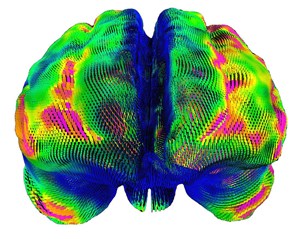CSF Biomarkers Alone May Predict Alzheimer's
by Deborah Brauser for Medscape:
Cerebral spinal fluid (CSF) levels of amyloid beta-42 (Aβ42) may be associated with Alzheimer's disease (AD) ― independently of whether a patient has the apolipoprotein E (APOE) gene, new research suggests.
A multicenter, multinational study of more than 1300 adults showed that those who carried the APOEgenotype had significantly lower CSF levels of Aβ42 than noncarriers. However, CSF levels and APOEstatus were each independently significant predictors of AD diagnosis.
Further analysis showed that APOE Ɛ4 carrier status did not influence the CSF levels of Aβ42 in a secondary group of younger participants between the ages of 20 and 34 years who did not have dementia, or in a group of older patients who had symptoms of mild cognitive impairment (MCI).
"These data strongly suggest that CSF levels of Aβ42 reflect cortical Aβ deposition and not the APOEƐ4 genotype per se," investigators, led by Ronald Lautner, MD, from the Department of Psychiatry and Neurochemistry at the Institute of Neuroscience and Physiology at Sahlgrenska Academy at the University of Gothenburg in Sweden, write.
"Consequently, the clinical cutoff level for CSF Aβ42 should be the same for all APOE genotypes," add the researchers.
Independent PredictorsPrevious research has shown that APOE Ɛ4 modulates CSF levels of Aβ42. However, questions have remained as to whether "this effect is secondary to the association of the APOE Ɛ4 allele with cortical Aβ deposition or whether APOE Ɛ4 directly influences CSF levels of Aβ42 independently of Aβ pathology."For the current study, they examined patient data from 4 memory clinics located in Sweden, Germany, and Finland. From this, the researchers formed 3 cohorts.The first (cohort A) consisted of 1345 people between the ages of 33 and 99 years for whom samples of CSF levels were taken at baseline. These participants included 309 with AD and dementia, 287 with mild AD, 399 with stable MCI, 99 with other dementias, and 251 healthy peers.
Cohort B was made up 105 individuals between the ages of 20 and 34 years who did not have any neurodegenerative condition but for whom CSF baseline samples were available.
The older cohort C consisted of 118 participants in the Biomarkers for Identifying Neurodegenerative Disorders Early and Reliably (BIOFINDER) study. All were from Sweden, between the ages of 60 and 80 years, and had MCI symptoms. They all underwent a CFS tap and flutemetamol F 18 positron emission tomography imaging.
In addition, data from another cohort consisting of older participants in the North American Alzheimer's Disease Neuroimaging Initiative (ADNI) were examined. For all 53 individuals (9 with AD, 33 with MCI, and 11 healthy control participants), CSF samples were available, and all underwent carbon 11–labeled Pittsburgh compound B scanning.
Results from cohort A showed significantly lower CSF Aβ42 levels in the group members who carriedAPOE Ɛ4 vs those without the genotype, regardless of diagnosis (P < .001 for all diagnostic groups).
"Despite this, CSF levels of Aβ42 differed between participants with AD when compared with controls and those with stable [MCI], even when stratifying forAPOE genotype (P < .001 to P = .006)," report the investigators.
In addition, "we performed multiple binary logistic regression models that revealed that the CSF concentration of Aβ42 and the APOE genotype were independent statistical predictors of AD diagnosis," they add.
When examining cohort B, the investigators found no significant effect from APOE Ɛ4 status on CSF levels of Aβ42. And there was no effect found in cohort C, even when "stratifying for cortical uptake" of flutemetamol F 18.
Finally, APOE Ɛ4 status did not influence the CSF levels of Aβ42 in the ADNI participants examined.
Diagnostic Fine-tuning
Commenting on the study for Medscape Medical News, Keith N. Fargo, PhD, director of scientific programs and outreach for the Alzheimer's Association, said the study "fits into the world" of early detection of AD.
"You want to know as early as possible so you can change the course of a disease before it does too much damage. This paper asks about diagnosis and how useful [CSF] levels are," he added.Dr. Fargo noted that CSF Aβ has already been shown to be a biomarker. But the current study "fine-tunes how we can use CSF in different populations.""It almost gets to the idea of personalized medicine: what do CSF levels mean to you if you have APOE Ɛ4 vs if you don't have APOEƐ4?"He added that this is part of a current debate going on in the field of AD research ― especially what CFS levels of Aβ mean for individuals vs large groups. "While it's a technical paper, they're trying to answer this question.""Some people have argued that we need a different cutoff for people with APOE Ɛ4 when we're trying to figure out if they are at risk for Alzheimer's disease, based on their CSF level. But this paper is telling us that that is apparently not true," said Dr. Fargo."It's saying that regardless of whether you have APOE Ɛ4 or not, CSF levels of amyloid beta are still a very good, very consistent indicator of whether or not you have high levels of amyloid beta in the brain and probably Alzheimer's disease," he said.However, he added that more research is needed. "This paper goes to the fact that the more resources we can put into research around [AD], the closer we're going to get to a treatment or prevention for it. This is just another step along the road towards meeting that ultimate goal."Source: http://bit.ly/1oahcfO

